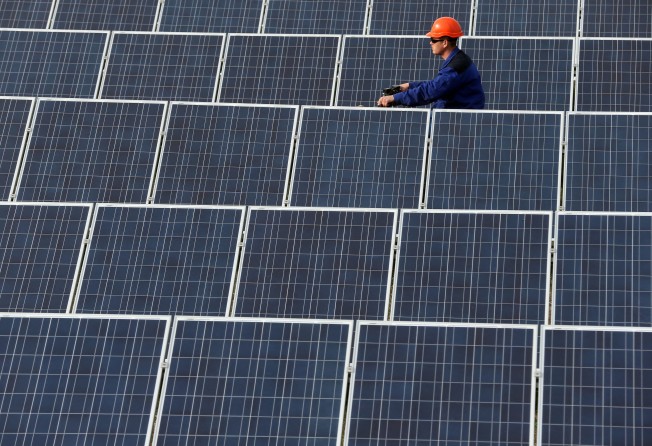Solar power firm's spree on bond sales casts shadow
Despite doubts about United PV’s prospects, big-name subscribers and soaring share price add mystery over spate of convertible issues

Heads turn when big names enter the game. That was what happened at United Photovoltaics Group, which has seen its share price shoot up by 70 per cent in less than two months.
Nine major mainland and international financial houses have agreed to buy more than HK$4.5 billion of convertible bonds from the solar power producer.
Among them are Ping An Insurance (Group), Citic Capital, China Huarong Asset Management and Fosun International.
The details are, however, puzzling.
First, United PV's financial safety is in doubt. Its current liabilities amount to HK$1.8 billion. And the figure excludes some contractual obligations that have to be settled in the near future.
Auditor Price Waterhouse said this indicated "the existence of a material uncertainty which may cast doubt on the company's ability to continue as a going concern".
Second, the borrowing cost far exceeds United PV's project return, if any. It is paying about 14 per cent annually - a 6.75 to 7.5 per cent coupon plus a 20 per cent premium on repayment in three years - to borrow through the bonds.
The company's solar plant operation lost about HK$300 million last year if a HK$659 million revaluation gain of financial products is excluded. More than 70 per cent of its HK$523 million revenue was receivables.
How is the company going to repay?
Money Matters asked several bankers. They all had a good laugh. As long as the share price performs well, who cares about the repayment, they said.
The fact is, most of the big names investing in the bonds would have packaged them into high-return financial derivatives for their investment-hungry clients.
It will be a derivative that offers very attractive terms, with close to 10 per cent annual return guaranteed.
It promises a conversion into the shares of a Hong Kong-listed company that has a stellar price performance and investor list.
The conversion price is low with a 10 per cent premium.
It is secured by the ownership and cash flow of power plants.
That is far better than those flimsy trust products on offer in the mainland market nowadays. The new rich would jump on that.
The big names are happy too. They get to unload their risk while enjoying a wide interest spread.
So is the company. It does not have to repay if the share price stays above the forced conversion level for 18 days.
Forced conversion is set at HK$1.50. The stock has been hovering between HK$1.45 and HK$1.50 for three weeks.
Once forced conversion sets in, the company's equity will increase, lowering its 290 per cent net debt to equity ratio and making it more attractive.
Even if it trades below the mandatory conversion point, a rising stock price will bring in new investors to pay off the old convertible bonds and release pledged assets for the issue of new bonds.
In short, the further the share price rises, the higher the book profit the derivatives carry, the merrier the derivative holders and the bigger the demand for the convertible bonds.
Needless to say, United PV is not alone into this. Any mainland financial firm has a dozen such bond investment proposals on its table.
So far, the share price has kept the mill going. It has hung on despite Thursday's market correction.
How it happened is anybody's guess. Was it because of the investment by the big names that was publicised in various investors' chat rooms? Or the non-binding strategic agreement involving mega price tags it has signed with various giants? Or the dozens of investor conferences its management has been attending?
Was it because of the turnaround story made possible by a significant revaluation of convertible bonds issued earlier? Or it is simply riding on the market momentum?
Whatever the cause is, it does not take much for the share price to go up. United PV has a market capitalisation of only HK$7 billion and its daily turnover was between HK$100 million and HK$200 million in recent weeks.
The big question is what if the price goes down. The answer will not be something new. It will be a mini-bond saga.